Revisiting Pharaoh, the complex city-builder that rewards meticulous planning
Making ancient history with Sierra’s classic city-builder.
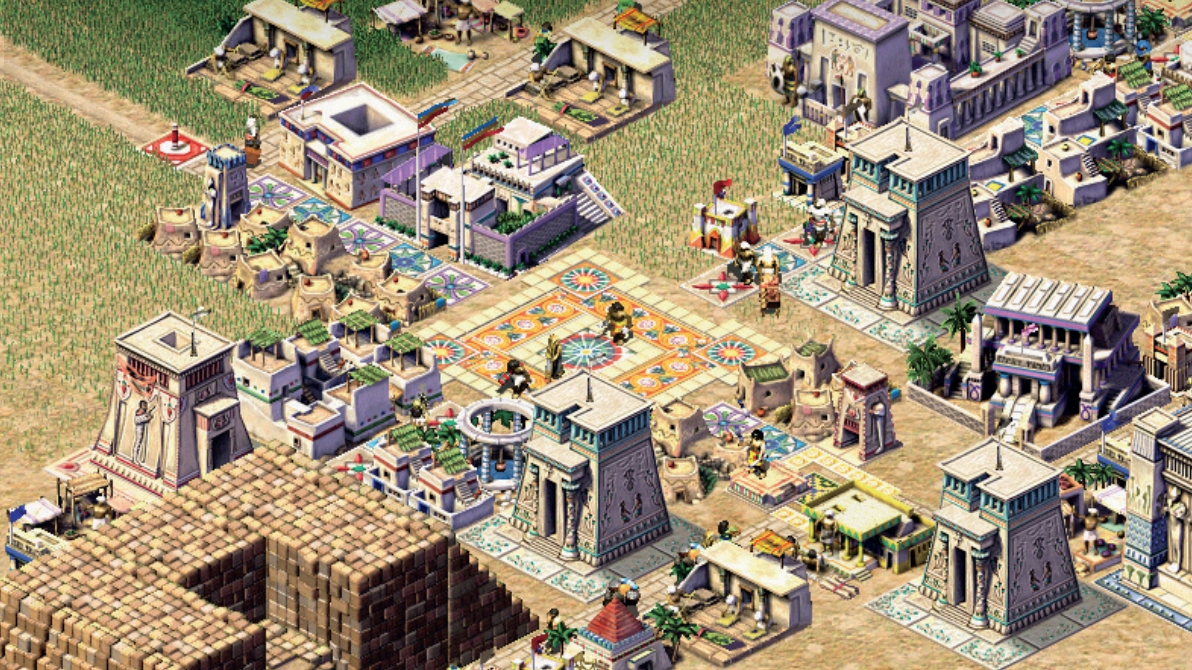
Reinstall invites you to join us in revisiting classics of PC gaming days gone by. Today, Lorna Reid builds a dynasty in Pharaoh.
Back in the late ’90s, Sierra’s historical city building series ruled the roost, garnering high review scores and oodles of respect. It comprised around a dozen games and expansions, most of which were isometric with a sim feel and a stern emphasis on micro-management. pharaoh entered the scene in 1999, following the much-loved Caesar III. It took Sierra’s series out of Rome for the first time, moving the action to Ancient Egypt, and delivering the sort of complex experience that had become typical of the series.
As with its brethren, and retro management-style games in general (Colonization springs to mind), it can be brutal to play in spite of how simple it may appear. Quaint and lovely though it looks, when you shove the lid off the game’s sarcophagus, you’ll find it has a nastier streak than Imhotep. While it won’t consume your vital organs, it will devour your time and stretch your patience to breaking point.
You play a dynasty rather than a character, and throughout the main campaign you follow them through successive generations as you rise in rank and notability. In each mission in a campaign, there are a number of smaller goals, such as filling a granary, having ten modest apartments or brewing beer; and tougher long-term goals, such as raising your Prosperity or Kingdom Rating to a certain level.
It is relatively easy to grasp the basics of building homes and supporting buildings and infrastructure, but it isn’t long before the difficulty ramps and threatens to overwhelm. With new chains of industry coming in quick succession, it feels like some sadistic wag at Impressions Games has stepped to Pharaoh’s metaphorical conveyor belt and tugged down a giant lever, sending new information and elements vomiting out and into my already full hands.
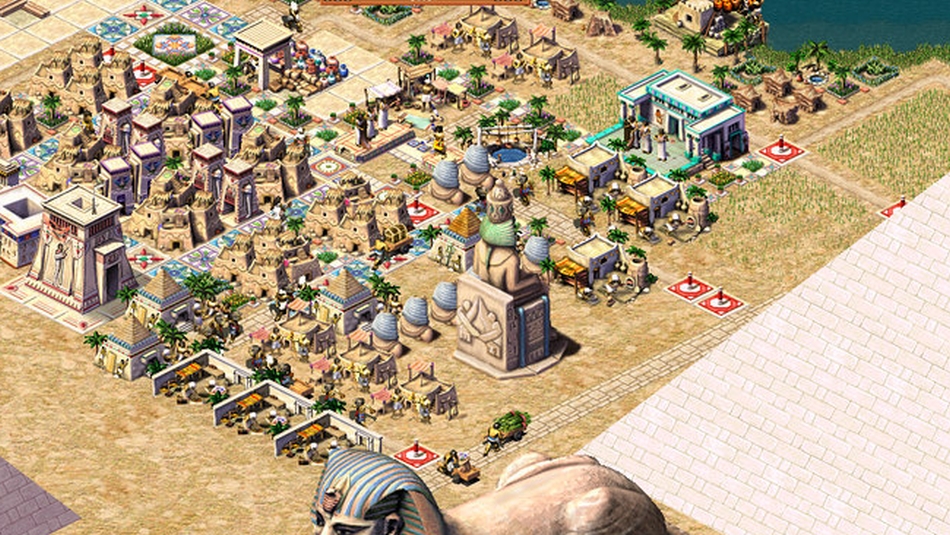
Knowing roughly what order in which to tackle things and trying to anticipate needs is a good strategy, but it’s far from easy. There’s always a spanner lurking, waiting to hurl itself into the works, especially with the game’s delightful way of teaching by way of negative events. Build gold mines, I’m told. I do so. Soon afterwards, they suddenly collapse because I apparently need an Architect’s Post. At this point the game brightly informs me that this new building has just become available... while I’m still staring at the dust clouds rising from the rubble of my once splendid mines.
Meticulous planners are well suited to Pharaoh’s challenge. Players who, like me, have a predilection for winging it—who gallop through the game, throwing down houses and industry—will end up having a far tougher time. Building placement is more crucial than it first appears, and those early days laying out the bones of a city are key, especially given how damn needy the residents are.
On top of this stifling amount of responsibility come the gods and their divine tantrums, and an often stroppy Pharaoh whose whims must be catered to.
If you want your housing to upgrade and become more desirable (often a mission goal), you’ll need all sorts of resources, including pottery, beer, access to schools and healthcare—all of which have chains of buildings and resources associated with them. It’s easy to let costs spiral and the city’s sprawl become unorganised, which can be especially problematic if, like me, you haven’t left room for buildings that will be introduced later on. Try cramming a mortuary into the back garden of a row of posh houses and see how well that goes down.
The biggest gaming news, reviews and hardware deals
Keep up to date with the most important stories and the best deals, as picked by the PC Gamer team.
On top of this stifling amount of responsibility come the gods and their divine tantrums (no ten plagues, sadly, not even locusts or John Hannah), and an often stroppy Pharaoh whose whims must be catered to. At least the gods are marginally easier to deal with and they can be a boon if you play things well. With only a few from a selection of five gods appearing in each mission, your job is to appease all of them. Get it right and you’ll be showered with blessings, but get it wrong and they will punish you. He obviously appreciated all the boozy festivals. A falling Kingdom Rating spells trouble. The lack of moisture farms is a shocking oversight. They appreciate lavish, beer-fuelled festivals (who doesn’t), which means you’ll need to crack on with barley farming and beer production to prevent literal disaster.
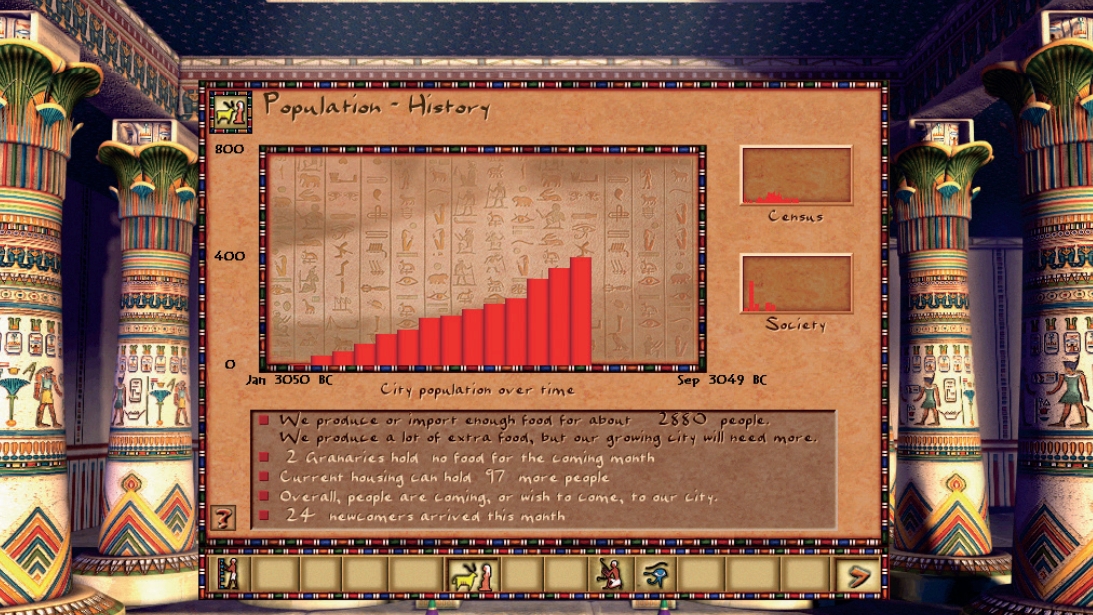
With so much to juggle and keep ordered, it can be very hard to regain footing if you slip. When in the thick of playing, merely dragging your arse while producing a specific resource can cause an entire game to be scuppered down the line. My own frustrating downfall was caused by pottery, of all things. With a well-established city flourishing before me, I was feeling confident as I began to field all manner of tedious Pharaonic requests, often only delivering them by the skin of my teeth. And then, suddenly, there was one I failed to meet. I’d already managed, mostly through slipshod financial management, to send my Kingdom Rating plummeting, and a lack of colourful pottery was apparently the final straw. I found myself and my Rating past the point of no return, and the Pharaoh’s beefy army was promptly dispatched to dish out punishment in the form of sudden and sharp death. My army was no match for his, and his troops laid waste my city. Bugger.
I persisted, restarted, and this time stockpiled pottery sooner, but still couldn’t meet the quantity required. Once again, my Rating fell and the Pharaoh’s army wiped me out. It was around this time that my mouse inexplicabily broke into a dozen pieces.
The Kingdom Rating—which is Caesar III’s Favor renamed—is the source of many of the game’s frustrations. If this takes a tumble, which it can do if you are in debt at the year’s end, don’t send military aid for allies, or fail to comply with the Pharaoh’s requests (me, me, me also) then you’re in trouble. For a spendthrift player like myself, this is all too easy to screw up.
The debt problem isn’t helped by the fact that, during some of the earlier campaigns, there are very few means of gathering money open to the player. There may only be one city that is looking to buy something that you produce, via a trade route, and the rest of your income has to come in the form of taxes. My quick fix of raising these to bring in some extra cash did not go down well, and led to a grumbling populace and eventually a mass exodus of people and their carpets. Buildings downgraded themselves, pulling down the tone of many neighbourhoods, causing even more disgruntled citizens to throw themselves onto the streets.
Attempting to perk up the Kingdom Rating by chucking down more buildings to produce resources can risk worsening any debt. If I wasn’t playing a campaign with an aggro Pharaoh, then rather than being wiped off the map, I’d end up waiting hours for my city’s fortunes to repair themselves enough to meet the now-distant win conditions.
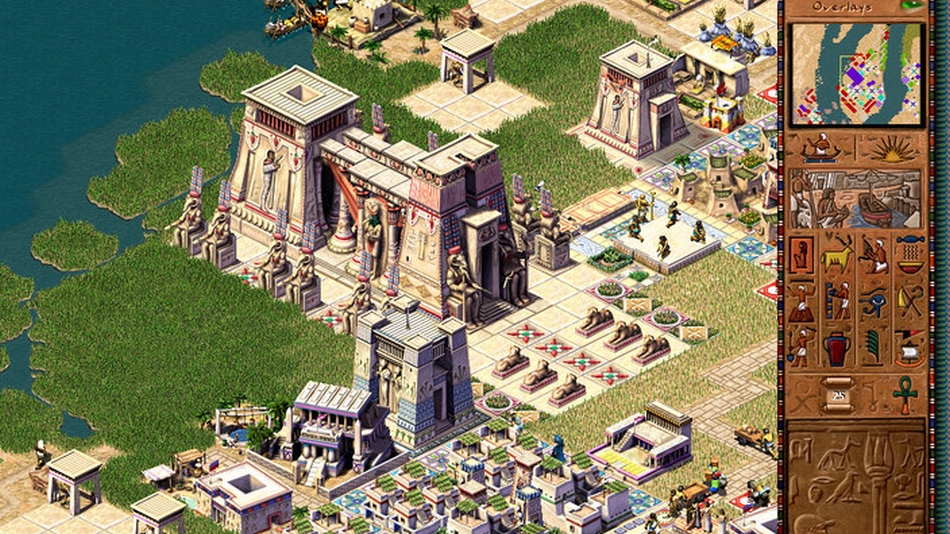
My major issue is that the Pharaoh’s army is unstoppable, and once I’d pushed past the point of no return there is no comeback. An unbeatable army seems pretty cheap—it felt like the management equivalent of being dead-ended in an old text adventure, when you realise that the thing you did back at the start has irretrievably screwed up your game, hours (or even days) down the line. In these circumstances, playing Pharaoh becomes almost a memory puzzle, where you try to complete the right tasks in the right order as quickly as possible to avoid a game-ending situation. It rather strips the joy from proceedings, frankly.
Such a penalty feels harsh after you’ve slowly, organically built a city. It takes time to get things exactly where you want them, and it can all be for naught. It does build the tension, though, and helps drive the pace, which, I suppose, is something. Thankfully, not every campaign is like this, but you still never know what’s around the corner. I suppose another positive is that it inspires a greater level of focus, but the prospect of so much time going to waste isn’t appealing, no matter what decade you’re playing in.
And yet, as much as I want to condemn the devs to the Hom-Dai much of the time, Pharaoh has that enviable ability to pull me in and keep me there. Like all successful management games, it just about walks the thin line between frustration and challenge, and thus it remains, to this day, an utterly absorbing, enjoyable thing to play.
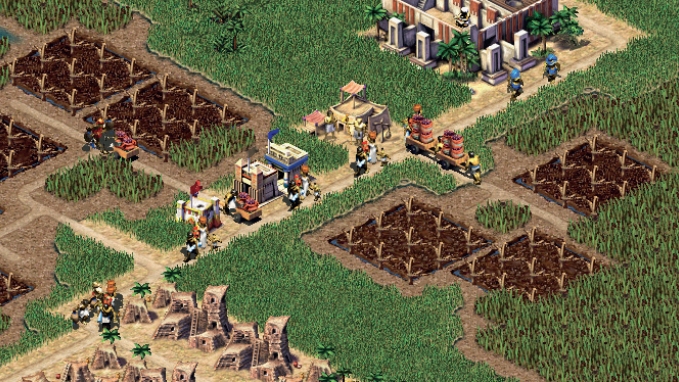
Even without the Cleopatra expansion—which adds new campaigns, buildings and plagues of locusts—there’s much mileage to be had here, thanks to a large and varied sandbox mode. This lets you select from a number of missions, some of which have set goals to be completed in a specific timeframe, whereas others thankfully leave you to your own devices, with no threat of military trouble. These days you can pick the game up for under eight quid which, given the sheer amount of time you can spend playing, is well worth it. Just remember to tweak the display and crank down the speed settings, or you’ll be playing like Benny Hill dialed up to eleven.
Pharaoh, like its city-building kin, is a game that’s ripe for a reboot. The underused but compelling historical setting, coupled with the prevailing wind of nostalgia for more retro graphical styles, and plenty of ideas to be cribbed from Tropico and others, could lead to a stunning return from the afterlife. The timing feels just right. For all the innovative deaths to be found in today’s games, there is still much amusement to be had in watching a death by hippo. Where else can you enjoy that?

